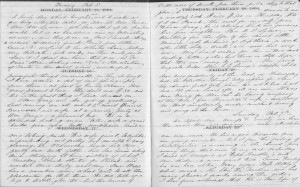 Hedwiga Regina Shober Gray diary, entries for 5-7 February 1864. R. Stanton Avery Special Collections
Hedwiga Regina Shober Gray diary, entries for 5-7 February 1864. R. Stanton Avery Special Collections
For the last six months or so, I have been engrossed in the daily diary of Hedwiga Regina (Shober) Gray (1818–1885), a Philadelphia-born Boston lady who wrote about her family, her household, and the larger world between 1860 and 1884. In almost a dozen blog posts I’ve quoted Mrs. Gray on contemporary celebrities (Mrs. Jack Gardner’s behavior merits a scolding for being “fast”; the diarist’s children see Tom Thumb perform and are “much pleased & amused”); on the danger of fire in the household (Mrs. Henry Wadsworth Longfellow is burned to death, while Eliza Winthrop survives a mattress fire); and on the painful grief associated with settling a beloved sister’s estate as relationships degrade between Mrs. Gray, her surviving sisters, and their younger brother.
The Gray diary begins with the diarist’s children ranging in age between thirteen and three, and ends twenty-five years later with two of the sons married and raising children of their own. Mrs. Gray’s long marriage to Dr. Francis Henry Gray closes in sadness, after the doctor’s lengthy and debilitating illness, and the elderly lady who pens the 1880 entries seems more than a generation removed from the bustling young matron of 1860.
The family’s economic position, so modest during the 1860s, improves somewhat as Dr. and Mrs. Gray receive family legacies; what helps even more, it seems, is that Mrs. Gray’s sons grow up and live at home until they marry, pooling their incomes to keep the family house in Beacon Hill Place (and, later, Mount Vernon Place) in comfortable order. Frank and Mary Gray, the two eldest children, are much in demand socially, but neither one chooses to marry, and it is interesting to see how Sam and Morris Gray conduct their courtships beyond their mother’s gaze: both engagements come as something of a surprise to Mrs. Gray.
The diarist must mention thousands of people in the diary, many of them known personally to her. Over the course of many years, she notes Eliza Winthrop's father's habit of marrying wealthy women (22 October 1865), and she worries that the Peabodys are too prone to marry their cousins (11 November 1884). She writes tartly that Senator and Mrs. Charles Sumner – who parted soon after their marriage – are each to blame for the failure of their union, both of them too selfish and flighty to sustain a relationship (19 January and 23 February 1868). The diary boasts hundreds more such entries, including a late reference to my great-great-uncle William Pratt Lyman (1860–1924), whom Mrs. Gray recalled as a small boy on Bowdoin Street. Now a senior at Harvard, young Lyman was, she wrote, "quite a handsome young man"! (24 July 1882)
Share this:
About Scott C. Steward
Scott C. Steward has been NEHGS’ Editor-in-Chief since 2013. He is the author, co-author, or editor of genealogies of the Ayer, Le Roy, Lowell, Saltonstall, Thorndike, and Winthrop families. His articles have appeared in The New England Historical and Genealogical Register, NEXUS, New England Ancestors, American Ancestors, and The Pennsylvania Genealogical Magazine, and he has written book reviews for the Register, The New York Genealogical and Biographical Record, and the National Genealogical Society Quarterly.View all posts by Scott C. Steward →